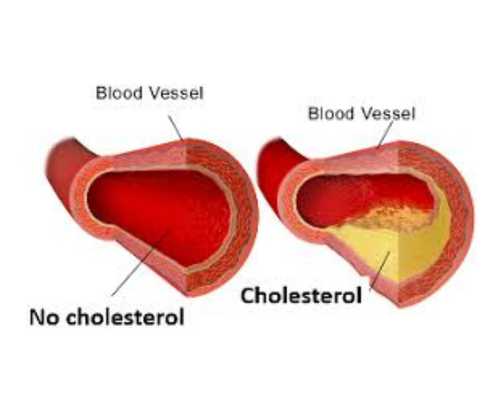
Of the topics mostly discussed almost everywhere, is the topic of Cholesterol. I wish us to have a better understanding of the relationship between cholesterol and health. How about you? Are you afraid of having high cholesterol? Are you taking Statins, (Cholesterol-lowering medication) or considering starting on one?
If you answered yes to any of these questions, I encourage you to consider the following facts:
1. Cholesterol is not a deadly poison, but a substance that you need to be healthy. High cholesterol itself does not cause heart disease.
2. People who have low blood cholesterol have the same rates of heart disease as people who have high blood cholesterol.
3. The cholesterol found in your blood comes from the following two sources:
a. Cholesterol in food that you eat.
b. Cholesterol that your liver makes from other nutrients.
The amount of cholesterol that your liver produces varies according to how much cholesterol you eat.
c. If you eat a lot of cholesterol, your liver produces less.
d. If you do not eat much cholesterol, your liver produces more. This is why a low-cholesterol diet does not typically decrease a person’s blood cholesterol by more than a few percent.
4. Drugs that solely lower your cholesterol do not decrease your risk of dying from heart disease, nor do they increase your lifespan. These drugs pose dangers to your health and may decrease your lifespan.
5. The cholesterol-lowering drugs – called statins – do reduce your risk of heart disease, but through mechanisms that are not related to lower blood cholesterol. And alarmingly, statins like Lipitor, mevacor, zocor, pravachol, and lescol are known to stimulate cancer in rodents.
6. The problem is that, the health system drugs deals with symptoms and not the cause.
What about HDL and LDL?
Well, here are some facts about LDL and HDL that the vast majority of my clients are surprised to learn:
• LDL and HDL are not types of cholesterol, as we always hear most people say.
• LDL and HDL are LIPOPROTEINS, that transport cholesterol through your blood circulatory system.
• LDL stands for Low Density Lipoprotein, and HDL stands for High Density Lipoprotein.
• LDL is often mistakenly thought of as being bad cholesterol because it carries cholesterol to your arteries.
• HDL is often mistakenly referred to as good cholesterol because it carries cholesterol away from your arteries (to your liver).
• LDL and HDL carry the same cholesterol.
Here are the main points to take away from the facts presented above:
Cholesterol that naturally occurs in animal foods is harmful to your health because it is damaged Cholesterol exposed to high levels of heat and/or harsh processing techniques.
(That is why, wild animals that do not eat cooked meat have no Cholesterol problems, and do not visit the Vet office, but domesticated dogs and cats do)
Can you imagine a long chain of wild animals in your town from the forest coming to your vet office? It is because they eat their food as nature intended.
If you regularly consume damaged cholesterol and foods that are rich in free radicals, you likely have significant quantities of damaged cholesterol floating through your circulatory system.
And if you regularly have damaged cholesterol floating around in your blood, then a high LDL level correlates with a higher-than-average risk of developing cardiovascular disease, and a high HDL level correlates with a lower-than-average risk of developing cardiovascular disease.
In other words, if you have significant amounts of damaged cholesterol in your blood circulation, you don’t want a lot of LDL to be available to carry this cholesterol to your arteries, where the damaged cholesterol can contribute to atherosclerosis, (Hardening of Arteries) and you want a lot of HDL available to shuttle damaged cholesterol away from your arteries.
So while it is true that a high HDL/total cholesterol ratio can reflect a lower risk of developing cardiovascular disease, what is most important when it comes to cholesterol and your health is to avoid eating animal foods that are cooked, since these foods are typically rich in damaged cholesterol.
Who sets Conventional Guidelines?
Sadly, conventional guidelines that promote lower cholesterol levels for a healthy heart are influenced in large part by pharmaceutical companies earning billions of dollars with their cholesterol-lowering drugs.
For example, in the summer of 2004, a panel of physicians lowered the “safe” level of LDL cholesterol from 130 to 100, and further recommended that people at high risk of developing cardiovascular disease aim to lower their LDL levels to 70.
This modification in medical standard of practice caused an estimated eight million Americans to become instant candidates for cholesterol-related drug therapy.
This raised revenue on statins as people bought more drugs to lower cholesterol.
While this “news” was covered by major media outlets and news wires, only one newspaper, Newsday, reported that most of the physicians responsible for establishing the new recommendations had a conflict of interest. Almost all had received money – usually in the form of grants or honoraria – from at least ten drug companies. The National Cholesterol Educational Program, the source of the new medical treatment guidelines for cholesterol, failed to report these financial disclosures.
Guidelines for Healthy HDL, LDL, Total Cholesterol, and Triglyceride Levels
I encourage you to consider the work of Uffe Ravnskov, MD, PhD ‘s personal guidelines on monitoring cholesterol. This is based on the research done on this issue, and evaluating the blood test results and health of hundreds of people he worked with over the past several years.
1. Ideally, it’s best to have a blood cholesterol level of over 150 mg/dL (3.9 mmol/L). But if your blood cholesterol level is lower than this, so long as you are eating a nutrient-dense, plant-centered diet and not suffering from any health challenges, there is likely no cause for concern.
Low cholesterol over the long term may lead to depression, increased risk of stroke, and numerous problems related to hormonal imbalances. If you are not getting enough vitamin D from your diet, having low cholesterol may lead to vitamin D deficiency, as sunlight creates vitamin D in your body by acting on cholesterol found in your skin.
2. Ideally, your HDL/total cholesterol ratio should be above 25%. Generally, the higher this ratio, the better. If this ratio is 10-15 percent or lower, there increased risk of eventually experiencing a heart attack.
3. Ideally, it’s best to have a triglyceride/HDL ratio of 2.0 or lower.
4. If your HDL/total cholesterol and triglyceride/HDL ratios are in the ranges listed above, and you are eating mainly undamaged cholesterol, having a total cholesterol of more than 200 mg/dL (5.2 mmol/L) most probably isn’t a cause for worry. In fact, even people whose genetics cause them to have total cholesterol above 350 mg/dL (9.0 mmol/L) have been shown to have no elevated risk of heart disease as long as their ratios are fine and they stay away from eating damaged cholesterol.
Here is my perspective on cholesterol and your health:
Rather than focus just on the numbers from your latest blood test, your health is best served by:
1. Ensuring regular intake of a wide variety of nutrient-dense plant foods (vegetables, legumes, fruits, whole grains, nuts and seeds).
2. Ensuring regular intake of healthy fats, such as those found in avocados, olives and coconuts.
3. No intake of animal foods that have been highly processed and/or exposed to high cooking temperatures.
4. Striving to live a balanced life that includes adequate rest, physical activity, exposure to fresh air and sunlight (without getting burned), meaningful relationships, and a sense of purpose.
Please read the following from EG. White:-
5. Vegetables, fruits, and grains should compose our diet. Not an ounce of flesh-meat should enter our stomachs. The eating of flesh is unnatural. We are to return to God’s original purpose in the creation of man. {TSDF 85.8}
In our sanitariums, we advocate the use of simple remedies. We discourage the use of drugs, for they poison the current of the blood. In these institutions sensible instruction should be given, how to eat, how to drink, how to dress, and how to live so that the health may be preserved. {TSDF 86.1} Testimony Studies on Diet and Foods.
Please note: Some organizations cite various studies that indicate that low-fat and low-cholesterol diets are healthier than diets that include generous amounts of healthy fats and undamaged cholesterol. The problem with these studies, as I see it, is that they don’t make a distinction between damaged vs. undamaged fat and cholesterol. And this is an extremely important distinction.
Dr Jerry J Masarira ND
drmasarirajj@gmail.com



.png)
.png)
What do you think? Leave a comment
0 Comment(s)